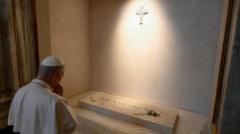At the heart of a small Irish town, a poignant story unfolds about a mother, Chrissie Tully, who has spent an incredible 76 years waiting for her son. Living in a modest council house in Loughrea, County Galway, 93-year-old Tully cherishes the hope that one day she will reunite with the child she was forced to surrender.
Her Enduring Hope: A Mother's Search for the Son She Lost 76 Years Ago

Her Enduring Hope: A Mother's Search for the Son She Lost 76 Years Ago
In rural Ireland, a mother's lifelong wish for her son reflects on societal stigma and the historical treatment of unwed mothers.
This heart-wrenching chapter of Tully’s life began in 1949 when, as a young girl, she found herself pregnant after falling in love. However, what should have been a moment of joy quickly turned into a lifetime of regret and sorrow. Following her pregnancy, Tully was ostracized by her family and the local community, leading a priest to take her to St. Mary’s Mother and Baby Home—a notorious institution where unwed mothers faced shame and isolation.
These homes became symbolic of a dark period in Ireland's past, where countless women and children experienced neglect and abuse, shielded by a society intertwined with strict Catholic ideals. The legacy of these homes continues to cast a long shadow, with numerous reports highlighting the injustices faced by those confined there. Recent attempts by the Irish government to compensate these individuals have seen many mothers and children seeking acknowledgment and justice for their past suffering.
As she tends to her daily activities, Tully keeps alive the hope of her son’s return. Surrounded by the comforts of home—small mementos and a friendly dog—she waits, reflecting on the love she never had the chance to share. The statue of the Virgin Mary in her living room symbolizes her unwavering faith, a silent witness to her enduring love and lifelong wish. Her poignant story is a reminder of the painful legacy of societal attitudes towards unwed mothers and the unresolved traumas that continue to shape the narratives of families across Ireland.
These homes became symbolic of a dark period in Ireland's past, where countless women and children experienced neglect and abuse, shielded by a society intertwined with strict Catholic ideals. The legacy of these homes continues to cast a long shadow, with numerous reports highlighting the injustices faced by those confined there. Recent attempts by the Irish government to compensate these individuals have seen many mothers and children seeking acknowledgment and justice for their past suffering.
As she tends to her daily activities, Tully keeps alive the hope of her son’s return. Surrounded by the comforts of home—small mementos and a friendly dog—she waits, reflecting on the love she never had the chance to share. The statue of the Virgin Mary in her living room symbolizes her unwavering faith, a silent witness to her enduring love and lifelong wish. Her poignant story is a reminder of the painful legacy of societal attitudes towards unwed mothers and the unresolved traumas that continue to shape the narratives of families across Ireland.





















